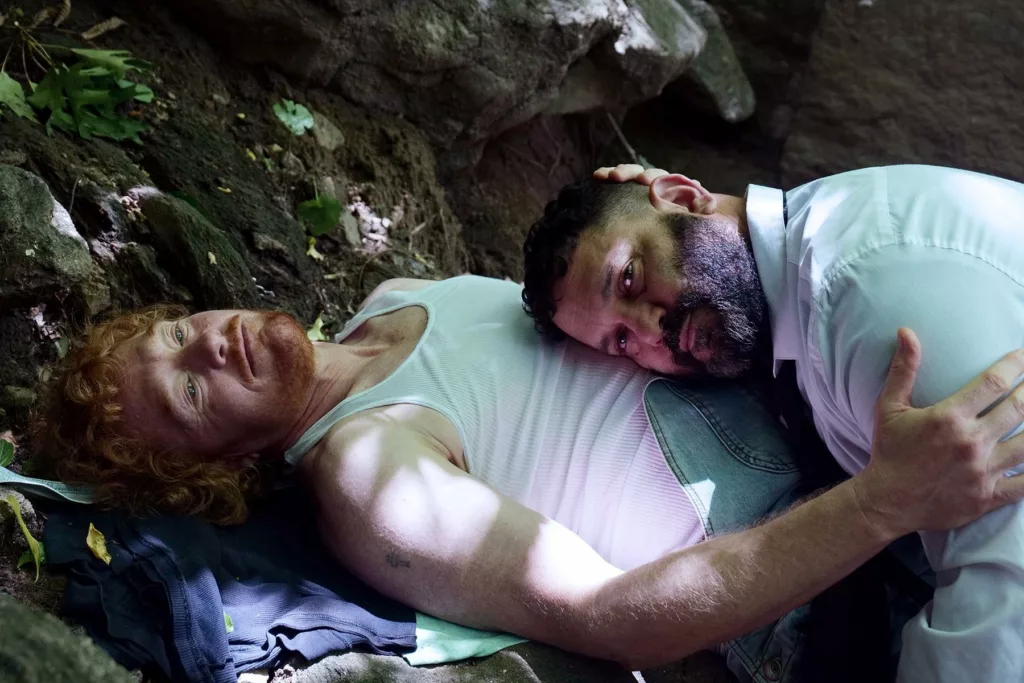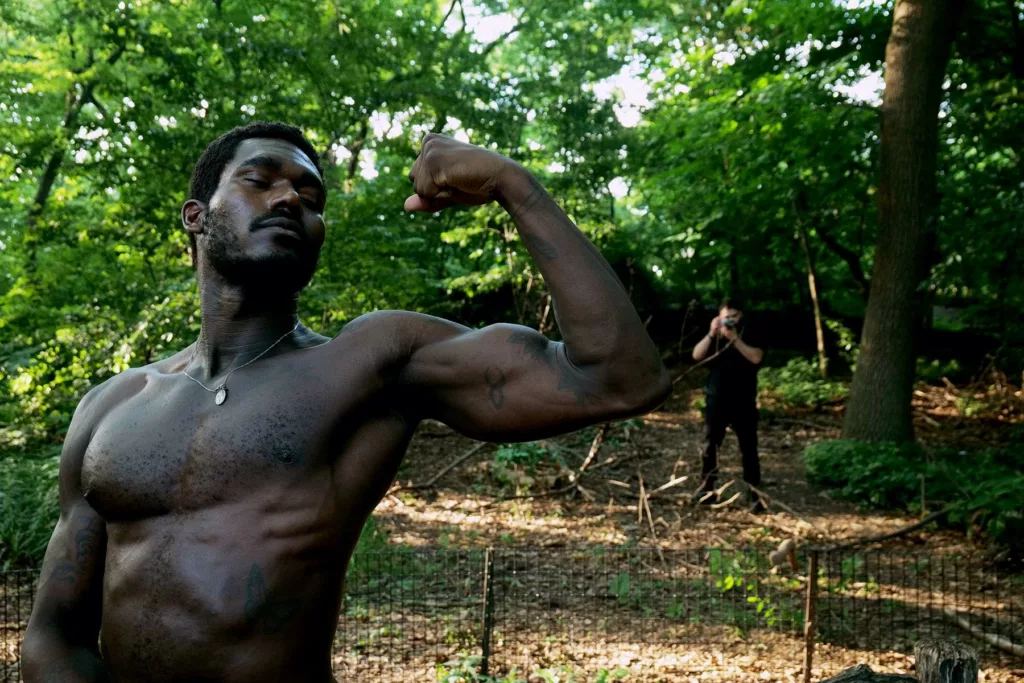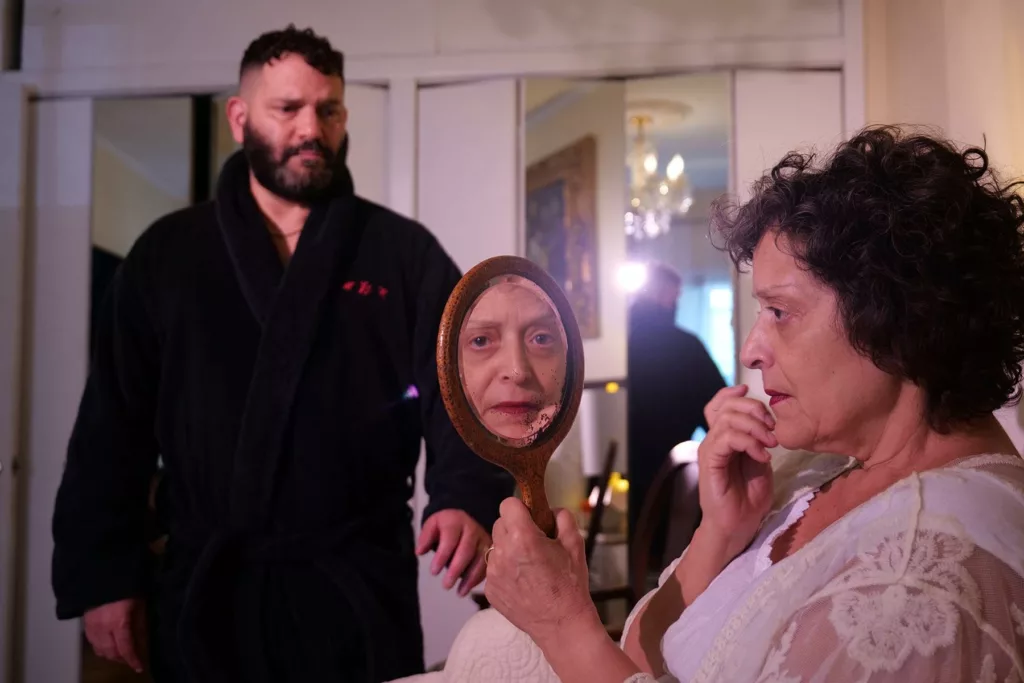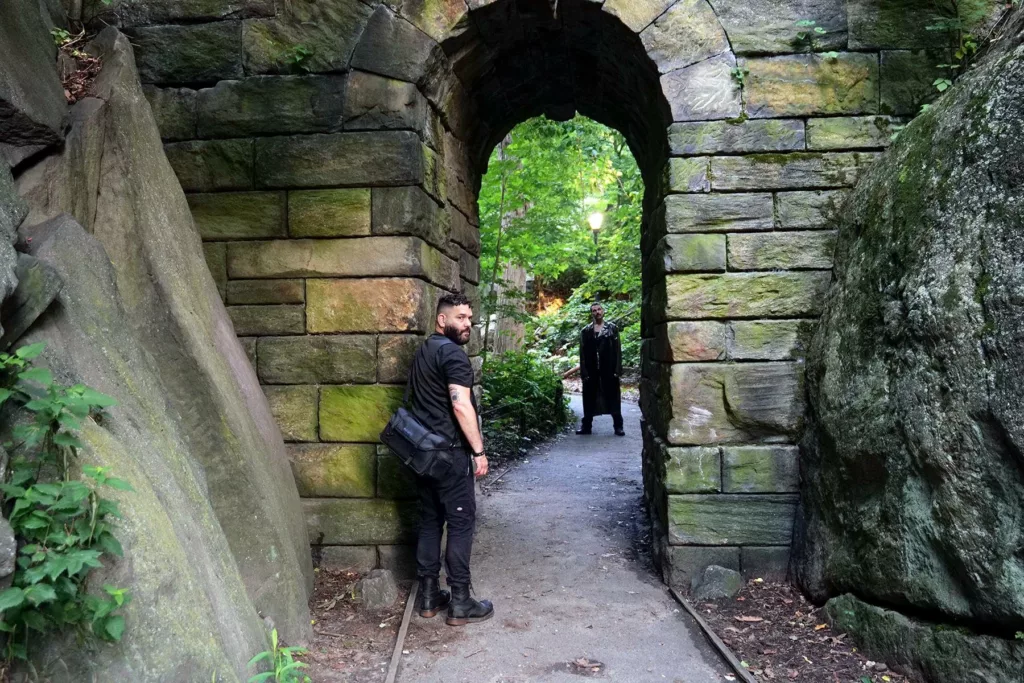Like a guilt-ridden guest creeping back after a decade away, Todd Verow timidly returns to his roots in the psychological thriller genre with You Can’t Stay Here. His raw, shoestring style established a cult following with previous urban suspense films set in his native NYC’s underbelly. But ensuing indie dramedies shone too bright a light on Verow’s versatility. So now, 25 years later, the prodigal director steps back into the shadows.
In a flashback to 1993 Manhattan, our guide to this cold city’s coldest corners is Rick. By day, the curly-haired photographer assists a kooky fashion boss. By night, he slinks off to Central Park armed only with a telephoto lens. Rick’s true passion develops in those dimmed developer trays – illicit snaps of furtive trysts between nameless men.
Yet all great voyeurs risk getting spotted eventually. As Rick soon discovers, he might not be the only one tracking these lost souls venturing off the lit paths after dark. Something evil lurks amid the shrubs, slicing through the anonymity these men crave along with their carnal pleasures.
Rick captures crime scene snapshots he can scarcely believe. But the cops likely won’t appreciate an amateur gumshoe who documents deviance for personal gratification. To overcome childhood demons demanding he turn a blind eye, Rick realizes he must take a monster’s final close-up himself. Can Verow still frame seductive suspense from a shoestring? His cult craves those raw revelations only possible shooting in cinema’s shadows once again.
Peeping Into the Darkness
Rick’s real passion develops in the dark. As a photographer’s assistant by day, he borrows his boss’s camera to nurture his own artistic side projects. Come nightfall, Rick sneaks off to Central Park’s most notorious hookup spot – a “cruising area” discreetly tucked into a corner known as the Ramble. He obsessively snaps secret shots of nameless men engaged in lust-fueled encounters amidst the shrubs.
Voyeurism pulls Rick back night after night, compulsively documenting these homoerotic acts performed by shadowy strangers. His telephoto lens zooms in on bulges and body parts rather than faces, preserving anonymity for his subjects and himself. As both participant and observer, Rick remains emotionally detached from the action he witnesses through the camera’s viewfinder.
Until the night he spies something even his lens cannot fully capture – a mysterious figure that sparks more questions than voyeuristic thrills. A tall, slender man lurks at the periphery, his semi-transparent dark latex coat and scalpel suggesting danger rather than desire. Over subsequent nights, Rick photographs unsettling clues: a bloodied, stumbling man who disappears into the woods; an abandoned, blood-smeared t-shirt snagged on a tree branch.
Rick’s curiosity intensifies upon developing these odd images in his studio’s darkroom. He blows up prints seeking clues, obsessively returning to the Ramble to piece together what sinister puzzle is afoot. But discovering one missing piece places Rick directly in the killer’s crosshairs. Reviewing photos once again, Rick spots that ominous latex-coated prowler from the first night – staring directly into his lens.
A twisted game begins between the watcher and this mysterious being who prefers to make men disappear. The hunter now attracting his own predators – including a local named Hale whose partner vanished days earlier. She pleads for Rick’s help while also eyeing him as a suspect.
As the police sweep intensifies, Rick realizes only he holds evidence of the Ramble predator’s identity. But can he pivot from passive peeper to proactive crime fighter even if it means risking the very anonymity he craves? Curiosity spirals into a dangerous obsession drawing Rick back repeatedly to these hunting grounds no matter the personal peril. After a lifetime of living through lenses as a means of escape, confronting this murderous figure could force Rick to finally lock eyes with his own demons. For if he dares develop that final print, this watcher worries he may see his own reflection staring back surrounded by darkness in the park that both protects and exposes those seeking forbidden thrills after sunset.
“Get ready for heart-pounding suspense in Trigger Point Season 2, as reviewed on Gazettely. Follow Lana Washington’s intense journey in London’s bomb squad, facing new threats and personal challenges in this gripping, action-packed TV drama.”
Seeking Forbidden Fruit in Shadowy Places
Cruising deeper into Central Park, Rick enters nature’s last haunt housing the hunted rather than the hunters. Here city-dwelling outcasts indulge forbidden urges under the moon’s mocking eye, nourished by darkness. Through his lens, Rick witnesses gay men grapple with societal taboos – pleasures only possible when concealed amidst bushes and trees.
Verow time travels back to a darker era of amplified AIDS paranoia when carnal delights often delivered cruel death sentences. Cruising zones provided perhaps the only outlets where men attraction could breathe free from fear, shame and repression imposed by a cold heteronormative world. Yet even these dimly-lit Edens cultivated their own sinister undercurrents for those already stalked by trauma and self-loathing in broad daylight.
As Rick’s camera hints, participating voyeuristically attempts to satisfy while keeping his own bicurious demons suppressed. Roaming these twilight playgrounds studying others mimics his own avoidance of intimacy using the lens as a protective barrier. Rick epitomizes countless LGBTQ+ souls of this era denied avenues for healthy self-discovery and expression. Survival instincts cultivated through childhood horrors nurtured secrecy over revelation, isolation over belonging.
Yet tailored temptation lurks for those seeking such environments to numb deeper pain by courting peril. Verow exposes universal human struggles with identity, repression and power dynamics through highly specified queer lenses capturing literal and symbolic shades of light and dark. Ambiguous personas seduce like Adam’s opaque latex coat masking deadly instruments resembling S&M gear. For broken men seeking pleasure or pain as salve, the snake symbolizes wisdom in distinguishing which truly heals.
Through this tense cat-and-mouse game between Rick and a killer named Adam, Verow explores the fine line between risqué risk and reckless danger. Ironically, the Peeping Tom lens intended as Rick’s shield from direct involvement instead sucks him into participation with humanity’s savage side. And facing one’s own suppressed traumas often requires confronting painful family legacies head on rather than escaping constantly into fantasy lifelines like photography. For behind the camera, beyond the mirrors and prints, looms the harshest judge – oneself.
By interweaving crime genre thrills with art film stylistic flourishes, Verow lures wider audiences into unflinchingly witnessing marginalized experiences. Then he cunningly erases dividing lines, revealing the most shocking monsters often take disturbingly familiar forms. Only be directly facing fears robbing life’s zeal can outcasts reclaim power to transform sites of former persecution into sanctuaries nurturing their truest selves. Andemerging from society’s shadows allows directing our own spotlights exposing human truths in shades beyond black and white.
“Embark on Jennifer Lopez’s genre-bending journey of self-discovery with our This Is Me…Now: A Love Story review. Witness a fantastical blend of music, autobiography, and Puerto Rican folklore in a spectacle that promises to bewilder and entertain.”
Homages to Horrors Onscreen and Off
Todd Verow clearly studied at the altars of cult thriller luminaries, leaving sacrificial offerings across You Can’t Stay Here for cinema sleuths to discover. A lipstick kiss to Friedkin’s 1980 leather bar noir Cruising is hard to miss as Rick roams parks picking up strangers’ trails. Flashing even further back, Michael Powell’s primal 1960 killer thriller Peeping Tom echoes through Rick’s compulsive documentation of vulnerable voyeurs and victims.
Antonioni’s 1966 murder mystery Blow Up likewise looms in Verow’s frames, with Rick’s radical photo enlargements shifting from erotic to forensic. Conjuring Hitchcockian suspense and Kubrickian menace, Rick’s reality gets projected until fantasy and truth blur amidst these nocturnal games. Just what developing darkness will be exposed?
Nodding to classics isn’t mere mimicry though, as Verow filters these tributes through his own art house alienation aesthetic. Shooting fast and cheap on the fly, performances take on a staged theatricality accentuating the narrative’s dreamlike veneer. Floating somewhere between experimental and exploitation, You Can’t Stay Here mesmerizes like arthouse plasma seducing grindhouse guts.
By fixating on society’s marginalized outsiders, Verow also continues his career-long study into the psychological underpinnings behind behavioral extremes. Why compulsively record risqué encounters? What past trauma transforms curiosity into pathological voyeurism? Much like with chemical addictions, once forbidden fruit gets tasted, greater risks hold greater allure for those fighting inner demons from family, society or even mortality itself thanks to the hungry AIDS epidemic’s lingering existential terror.
Verow sympathizes with inhabitants of NYC’s proverbial and literal gay underground while refusing to soften sharp edges. Addictive cycles of abuse victimize victims alongside violent perpetrators themselves. Only through radically painful confrontations with repressed individual and collective traumas can the process of healing finally commence.
You Can’t Stay Here admires cinematic landmarks while charting its own unclassifiable course. Verow continues honing his confrontational approach scrutinizing societal power dynamics and humanity’s darker desires. By luring wider audiences into LGBTQ+ experiences through seductive genre packaging, he then cunningly redirects the piercing lens back onto repressive mainstream mores. And the resulting self-reflection often proves the most shocking and thrilling reveal of all.
“Ride into the sunset with a gang unlike any other in our Outlaw Posse review. Mario Van Peebles’ Western reimagines the genre with a racially diverse cast and a narrative filled with action and depth. Is this posse worth joining for their daring adventure?”
Interpreting the Final Frame’s Blurred Lines
Ah, that ending. Todd Verow clearly studied under the ambiguous finale framing masters – David Lynch, Darren Aronofsky and other cunning craftsmen who embed meaning while withholding definitive answers. So viewers should set expectations accordingly before venturing into Verow’s closing moments. Just as with controversial forebear Cruising, don’t anticipate neat narrative resolution or comforting closure.
In his characteristic hands-off, implicit style, Verow fosters added audience engagement by inviting our interpretations to fill blurry spaces instead of forcibly over-explaining. He consciously clouds those pivotal final encounters between hunter Rick and seductive slayer Adam in Central Park’s deepest thickets. We witness their charged confrontation through veils – Rick’s dreamy memory, Adam’s translucent plastic coat, the ethereal mist between night and day in those shadowy woods.
This liminal setting suspends the pair in a transitional twilight state beyond cops’ reach where rules cease, codes blur and transformation hovers right at the vanishing point. The snake charmer Adam presents Rick with temptation – a surrogate bond offering passage from past trauma toward self-acceptance. But is the apple poison or platform for flight? Verow leaves such verdicts up to us.
Killer and chronicler lock eyes as the sun rises. Rick awakens alone, his instrument of fantasy and fear laying beside him. We scan for meaning from that final scene of his hands raised in sacrificial offering while processing events in RGB photochemical silence. Blood bonds and eroticism intermingle as control and submission roles fluctuate between these two. Peering through society’s tentatively lifting veil towards unobstructed authentic identity carries unavoidable pain. But once touched, can temptation still be denied?
You Can’t Stay Here refuses concluding with clarity. Echoing reality’s perpetual fluidity, Verow gifts his complex characters and viewers the liberating agency to define ourselves as scales fall and truth blurs. And sometimes finding ourselves requires losing our ways awhile and traversing the fog sans compass. Peeling restrictive labels lays souls bare at intersections between love and fear, creation and destruction, order and chaos.
But these contrary forces flow together as one inside each human heart. Harnessing their symbiotic power holds our most freeing salvation. Where this leads Rick and Adam emerges in morning’s reconciling light as their ultimate undeveloped picture.
An Unflinching Descent Into the Shadows
Todd Verow conclusively proves his penchant for confronting complex psyche struggles head-on – sans judgment yet pulling no punches depicting marginalized experiences. He drags us right through the darkest shadows veiling humanity’s heart, emerging wiser rather than traumatized if we dare digest difficult truths exposed.
You Can’t Stay Here offers no predictable plot beats, easy answers or reassuring resolution. We exit unsettled, senses heightened and minds racing to reconcile disorienting ideas discovered below society’s genteel veneer. Verow lures wider audiences by wrapping unconventional visual candy within familiar genre shells. But just like that plastic-cloaked killer seducing victims in Central Park’s lonely thickets, darkness hypnotizes until escape becomes impossible.
By fixating focus on outsiders often ignored, Verow spotlights universal themes of identity, repression and primal needs that bind humanity closer than divisive tropes. We access the exotic through empathy’s gateway before realizing the foreign was familiar all along. Stripped of inauthentic ornamentation, only piercing insight into unrealized truth remains.
Two decades deep into his iconoclastic career, Todd Verow keeps pioneering new pathways into uncharted emotional terrain. He continues advancing radical representation on screens large and small, mainstream and underground alike. You Can’t Stay Here proves his scrappy creative vision persists burning brightly no matter the budget. Verow consistently crafts complex characters and psychologically dense scenarios rivaling Hollywood’s finest through his stripped-down signature style.
Prepare to emerge a bit battered yet wiser from walking in outcasts’ shoes through his latestsetTaboo-busting urban opus. You Can’t Stay Here delivers chilling jolts of confrontation therapy addressing societal ills – something big-budget horror easily screams about yet rarely dares whisper. But lucky audiences now have Verow’s empathetic voice guiding descent into these redemptive shadows. Will we follow respectfully? Or look away when exposed scenes hit too close to home? The choice is ours.
The Review
You Can't Stay Here
Todd Verow's latest indie thriller offers an unflinching character study exploring marginalized experiences through familiar genre trappings. By walking compassionately in outsiders' shoes, the film exposes darker universal truths binding humanity together beneath surface divisions. You Can't Stay Here delivers everything one expects from Verow's stripped-down signature style - taboo-toppling scenarios, complex psychological themes and compellingly natural performances captured through inventively artistic framing. Fans of gritty urban suspense and radical representation will find this a confrontational yet highly gratifying descent into society's shadows well worth taking.
PROS
- Strong central performance by Guillermo Diaz
- Effective atmosphere and tension
- Impressive camerawork and visual style given the microbudget
- Ambitious themes related to sexuality, identity and psychology
- Doesn't shy away from dark, taboo subject matter
- Clever homages to classic thrillers like Peeping Tom and Blow Up
CONS
- Uneven pacing at times
- Plot can be vague and confusing
- Some amateurish supporting performances
- Ending is highly ambiguous
- Won't appeal to viewers wanting tidy resolution




















































